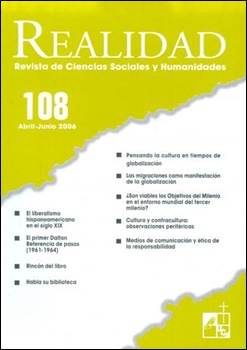Abstract
The economic models that are based on the market's supremacy suppress the responsibility of taking decisions from the subjects. Both the classical Liberalism, that defends the ruling paper of the market, and the current mediatic societies, ruled by technologic criteria, dissolve the responsibility and, thus, ethics. Nevertheless, the role of a critical communication, committed with its own responsibilities, is vital to transform this panorama.
Realidad: Revista de Ciencias Sociales y Humanidades No. 108, 2006: 285-292

This work is licensed under a Creative Commons Attribution-NonCommercial 4.0 International License.





